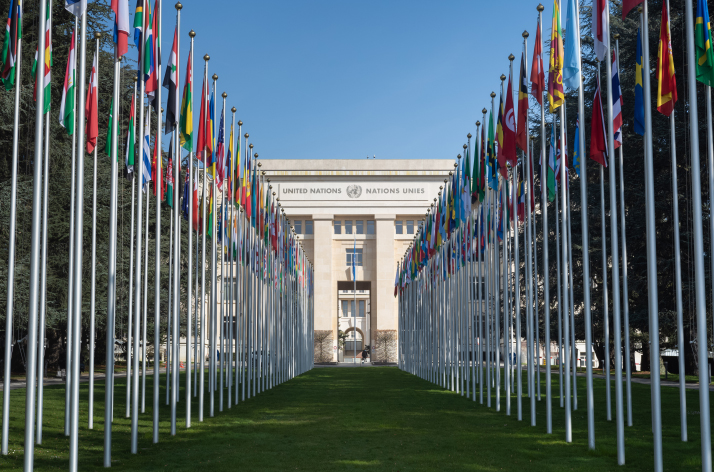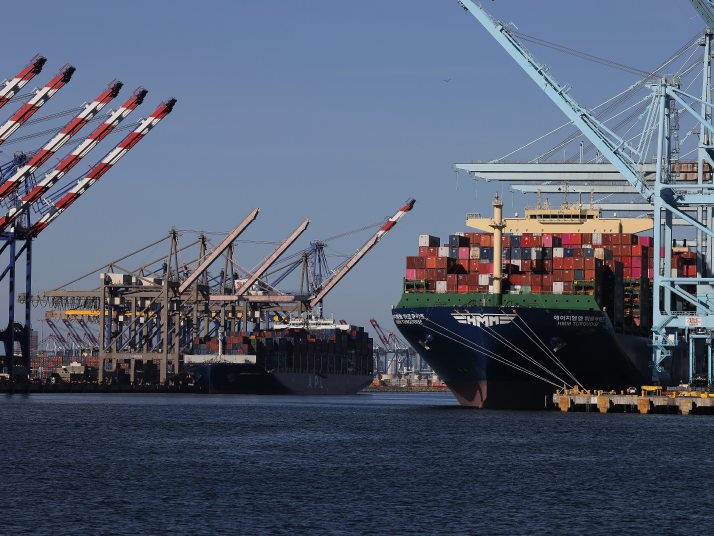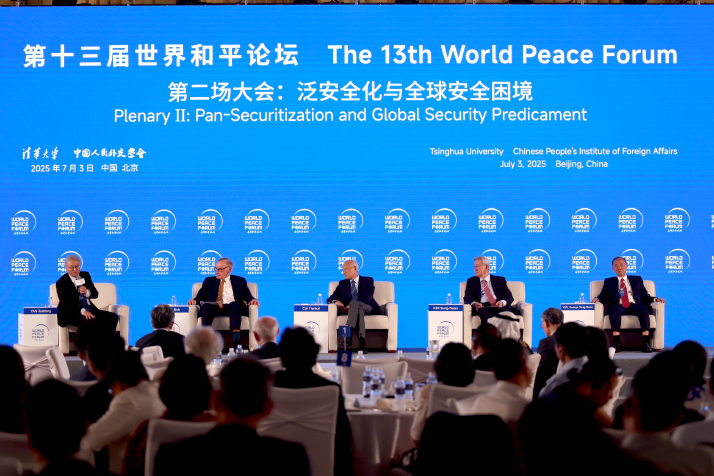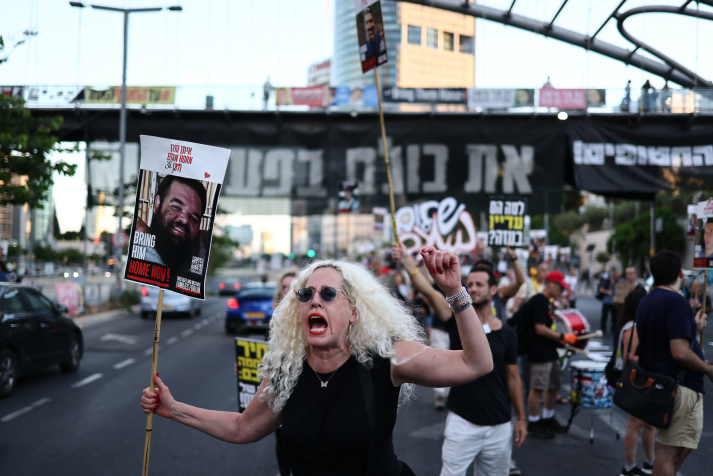| World |
| Conflict to common ground | |
|
|
 The United Nations Office in Geneva, Switzerland, on February 29, 2024 (XINHUA)
An old saying goes: "Peace is just an interlude between two wars." As the world marks 80 years since the end of World War II (1939-45), one must ask: Are we once again teetering on the edge of global conflict? In 2025, the international landscape is fraught with growing geopolitical and economic tensions. Major conflicts persist—most notably the prolonged crisis between Russia and Ukraine, as well as escalating violence in the Middle East, including Israeli military operations in the Palestinian enclave of Gaza and the country's rising tensions with Iran and other regional players. Meanwhile, under Donald Trump 2.0, the United States has embraced a more protectionist posture, and imposed higher tariffs on most countries—even longtime allies. At the same time, the Global South of developing and underdeveloped countries is becoming more unified, seeking to reform a global order increasingly marked by instability and uncertainty. These developments raise an urgent question: Do mechanisms like the United Nations and economic pacts still serve their purpose in sustaining long-term peace and coexistence? These concerns were at the heart of discussions at the 13th World Peace Forum, held in Beijing on July 2-4 under the theme Advancing Global Peace and Prosperity: Shared Responsibility, Benefit and Achievement. Co-organized by Tsinghua University and the Chinese People's Institute of Foreign Affairs, this year's edition gathered international participants to exchange views on how countries can collectively uphold peace and promote development amid globalization. Speakers emphasized the importance of abandoning zero-sum thinking and embracing the vision of a community with a shared future for humanity. Chinese Vice President Han Zheng addressed the opening ceremony on July 3, calling for jointly safeguarding of international fairness and justice and improving global governance mechanisms. "China is ready to work with all countries to promote peace and prosperity worldwide and to build a better future together," Han said.  Cargo ships docked at the Port of Los Angeles in Los Angeles, California, the United States, on May 10. California Governor Gavin Newsom criticized U.S. President Donald Trump's tariff policies in a May 11 interview, citing a 60-percent reduction in scheduled cargo ship arrivals statewide (XINHUA)
Changing the mindset Security was a dominant topic, with nearly half of the forum's plenary session and panel discussions dedicated to it. This agenda setting reflects a global trend, Yan Xuetong, Honorary Dean of the Institute of International Relations at Tsinghua, explained. "Everything is becoming a security issue," he said. "But paradoxically, this pan-securitization doesn't bring peace—it fuels more conflict." "Peace and security have always been core themes in the progress of human civilization," Liu Jianchao, head of the International Department of the Communist Party of China Central Committee, said at a luncheon during the forum. "Today, they remain among the most pressing and complex challenges we face globally." Liu pointed out that under the zero-sum mindset, only absolute security is seen as true security, even if it comes at the expense of others. He criticized the remarks of U.S. Secretary of Defense Pete Hegseth, who at the Shangri-La Dialogue in May declared that Washington is committed to "peace through strength." "That rhetoric is simply a rebranding of hegemonic thinking," Liu stressed. "What Hegseth truly seeks is force, not dialogue. What he fuels is confrontation, not harmony." Liu warned that such thinking risks dragging the world into "shared destruction." "The real danger we face is not about who wins or loses," he said. "It is about everyone losing together—and that's a cost human civilization cannot bear." Instead, he called for a complete shift in mindset: away from zero-sum competition and toward mutual respect, cooperation and shared development. Countries must seek common ground while setting aside differences, and work toward win-win solutions, Liu added. In recent months, China has actively promoted dialogue and de-escalation across key global hotspots. During his visit to Europe from June 30 to July 6, Chinese Foreign Minister Wang Yi called for a just resolution to the Palestinian issue, stressing the need to heed the legitimate voices of the Arab people and end the humanitarian crisis in Gaza. On the Russia-Ukraine conflict, China reaffirmed its commitment to neutrality—calling for negotiations, refraining from supplying lethal weapons to any party, and offering to mediate through global platforms. These efforts, including launching a "Friends for Peace" group at the UN with countries from the Global South, such as Brazil, have been broadly welcomed by the international community. From Liu's viewpoint, changing the zero-sum mindset "begins with freeing the mind." He concluded, "History will not judge our generation by how many wars we won, but by whether we preserved peace—and whether we brought lasting wellbeing to the people." At a plenary session titled Pan-Securitization and the Global Security Predicament, participants examined how the concept of security is being overextended and how a new, more constructive approach to global security is urgently needed. Cui Tiankai, former Chinese Ambassador to the U.S., warned that security concerns are being stretched to cover everything—from economic exchanges to technological cooperation, even to cultural and people-to-people interactions. "When everything becomes a security issue, we risk losing sight of what real security problems are," he said. "Instead of solving them, we multiply them—and, in the process, the world grows more insecure." Cui argued that the root of insecurity for certain countries lies in the growing resistance they encounter from others against their unilateral, hegemonic behavior. "The answer," he proposed, "is to adopt the vision of common, comprehensive, cooperative and sustainable security—one that includes all nations, excludes none and avoids targeting specific countries." He stressed the need to venture beyond superficial solutions and address the deeper causes of insecurity. Former Singaporean Foreign Minister George Yeo echoed this perspective, stressing the importance of morality in resolving the pan-securitization dilemma. "If we don't have peace in our heart, then no matter how clever our diplomats are, we cannot achieve world peace," he said, adding that it is important to develop a new sense of what is moral. He also noted that, in this regard, the Chinese proposal of building a community with a shared future for humanity is a moral necessity.  Participants at the second plenary session of the 13th World Peace Forum at Tsinghua University in Beijing on July 3 (COURTESY PHOTO)
The most important relations China-U.S. relations remain a central concern for the international community. Since returning to office in late January, Trump has taken a flurry of actions that have added new complexities to the bilateral relationship—including intensifying the tariff war and ramping up geopolitical maneuvering. These moves have set the tone for what analysts are now calling the "Trump 2.0" era of China-U.S. relations. At a July 4 panel titled China-U.S. Relations under Trump 2.0, scholars from both countries shared insights into how the relationship might evolve in this new phase. Thomas Fingar, a senior fellow at Stanford University's Freeman Spogli Institute for International Studies, noted that tensions between the two countries had already begun to escalate during Trump's first presidential term. In his view, the current term is unlikely to bring dramatic improvement, or a steep decline. Trump has recently softened his tone on China, expressing the desire for a "constructive relationship." Jia Qingguo, a professor at the School of International Studies at Peking University, pointed out that Trump's return to power could, in fact, generate new opportunities for bilateral ties. If the two sides can properly manage the tariff issue, the overall trade relationship could remain relatively stable, he added. Trump's transactional approach to diplomacy—often less driven by ideology—might create space for pragmatic cooperation in select areas, according to Jia. As Trump's second term nears its half-year mark, analysts are closely watching for signs of a shift in his China policy. According to Wu Xinbo, Director of the Center for American Studies at Fudan University, the Trump administration is more focused on relations with Russia, the crisis in Ukraine and conflicts in the Middle East. While China is not at the center of his policy agenda, it is connected to some of the administration's top priorities—particularly trade issues and fentanyl control. Following a phone call between Chinese President Xi Jinping and Trump in June, speculation has grown around a potential Trump visit to China later this year. "I believe President Trump is serious—perhaps even eager—to visit China this year," Wu said. In the June 5 call, Xi said he would welcome Trump to visit China again. In 2017, Trump visited China during his first term. Even if the visit does not take place, Wu believes that Trump's expected participation in the Asia-Pacific Economic Cooperation (APEC) Economic Leaders' Meeting in the Republic of Korea this October could provide an opportunity for a meeting between the two leaders. The people of both countries—and people around the world—hope for a friendly and positive relationship between China and the U.S., Liu said in the luncheon speech. Cui stressed that China's development goals have never been centered on competing with the U.S. "China's aim is not to overpower others, but to surpass itself," he explained. "If someone believes China-U.S. competition is about China challenging the U.S. for global dominance, that's a misunderstanding. We do not seek hegemony over anyone—and we oppose hegemonic behavior by any country, including the United States." BR  People demonstrate in Tel Aviv, Israel, on July 6, calling for a permanent ceasefire in Gaza and a deal with Hamas to secure the release of Israeli hostages held captive by the Palestinian military group (XINHUA)
Copyedited by Elsbeth van Paridon Comments to liwenhan@cicgamericas.com |
|
||||||||||||||||||||||||||||
|